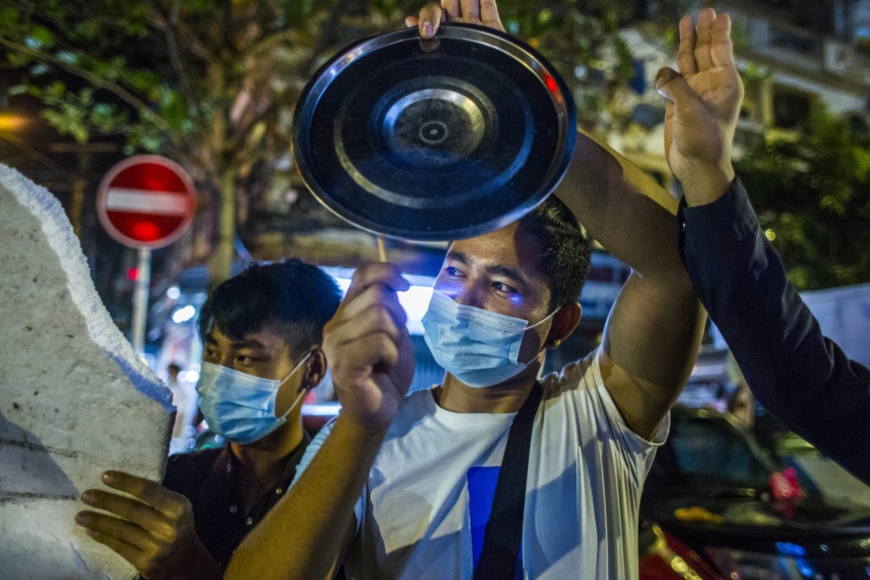[ad_1]
The Myanmar military’s shutdown of Facebook access following the ouster of the democratically elected Aung San Suu Kyi caps years of tension between the social media company and the most powerful institution in a nation where Facebook is used by half the population.
The junta on Wednesday banned Facebook Inc. until at least Sunday after the regime’s opponents began using it to organize. A new civil disobedience page had gained nearly 200,000 followers and the support of Burmese celebrities in the days after the coup, while a related hashtag was used millions of times.
“The Tatmadaw sees Facebook as their internet nemesis because it’s the dominant communication channel in the country, and has been hostile to the military,†said Phil Robertson, Asia deputy director of Human Rights Watch, referring to the country’s army.
“Since the Burmese people are rapidly moving online to organize a massive civil disobedience campaign, shuttering access becomes a top priority.â€
A company spokeswoman on Thursday urged Myanmar authorities to restore access to Facebook and WhatsApp to the country’s 54 million residents.
Facebook will have to decide how to play the delicate balance of protecting the democratic politicians and activists versus cooperating with the new regime to get services restored — an especially acute example of the political dilemmas the company faces worldwide.
In nearby Vietnam, for example, Facebook recently acquiesced to government demands that it censor more political criticism to avoid a blockade.
The service has mostly avoided shutdowns outside of countries such as China, where it has long been blocked, but currently faces pressure in India, Turkey and elsewhere.

In Myanmar, Facebook in recent years has engaged with civil rights activists and democratic political parties and pushed back against the military after coming under heavy international criticism for failing to contain online hate campaigns.
In 2018, it banned army chief Min Aung Hlaing — now Myanmar’s military ruler — and 19 other senior officers and organizations, and took down hundreds of pages and accounts run by military members for coordinated inauthentic behavior.
Ahead of Myanmar’s November election, Facebook announced it had taken down a network of 70 fake accounts and pages operated by members of the military that had posted either positive content about the army or criticism of Suu Kyi and her party.
A Reuters review early this week found dozens of pages and accounts alleging election fraud — the reason given by the army for seizing power. The posts started in October and continued after the election; in the 48 hours before the coup, many of the pages called for military intervention.
After the coup, those pages turned to posts accusing the ousted government of fraud and justifying the takeover, the review showed. Some of the pages published coordinated posts criticizing or threatening politicians like Suu Kyi as well as journalists and activists.
Facebook took down dozens of the accounts on Wednesday, shortly before being shut down. Reuters could not determine their provenance.
And just two days before the coup, the new military-installed information minister, Chit Hlaing, shared a story purporting to be from Radio Free Myanmar, which Facebook banned after it was used in anti-Rohingya disinformation campaigns. The minister was not immediately reachable for comment.
By Wednesday, both his account and the post were taken down.
A spokesman for the military did not respond to multiple calls for comment.

Facebook plays an outsized role in Myanmar, where for many residents it is synonymous with the internet.
United Nations investigators say that Facebook allowed the platform to be used by radical Buddhist nationalists and members of the military to fan a campaign of violence toward the Muslim Rohingya minority, 700,000 of whom fled an army crackdown in 2017.
In response, Facebook tried to tamp down hate speech and misinformation and ramped up partnerships with civil society, sometimes in conflict with the military. The company maintained its central role in the life for the country, and Suu Kyi’s government regularly announced major initiatives on its Facebook pages.
“A ban on Facebook is effectively a ban on the internet,†ethnic Kachin human rights advocate Zaw Htun Lat wrote on Twitter on Thursday. A Facebook spokeswoman referred Reuters to an earlier statement by Southeast Asia policy director Rafael Frankel, which states Facebook is “removing misinformation that delegitimizes the outcome of November’s election.â€
She added that the company is treating Myanmar as an emergency and is using artificial intelligence to restrict content likely to break its rules on hate speech and incitement of violence.
At the same time, the military has used Facebook since the start of the coup. Its “True News†information unit had provided daily updates prior to Thursday’s shutdown.
A page for the country’s new military president was created within hours on Monday. Since then, a handful of other official government pages have been taken over by the regime and are publishing official announcements from the ministry of information warning against social media “rumors†that could incite riots and instability.
Facebook declined to comment on how it decides who is permitted to control official government pages.
In a time of both misinformation and too much information, quality journalism is more crucial than ever.
By subscribing, you can help us get the story right.
[ad_2]
Source link





